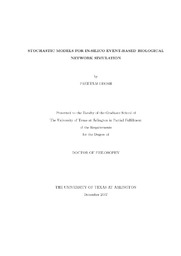
ATTENTION: The works hosted here are being migrated to a new repository that will consolidate resources, improve discoverability, and better show UTA's research impact on the global community. We will update authors as the migration progresses. Please see MavMatrix for more information.
Show simple item record
| dc.contributor.author | Ghosh, Preetam | en_US |
| dc.date.accessioned | 2008-04-22T02:41:21Z | |
| dc.date.available | 2008-04-22T02:41:21Z | |
| dc.date.issued | 2008-04-22T02:41:21Z | |
| dc.date.submitted | December 2007 | en_US |
| dc.identifier.other | DISS-1890 | en_US |
| dc.identifier.uri | http://hdl.handle.net/10106/708 | |
| dc.description.abstract | The multi-scale biological system model is a new research direction to capture the dynamic measurements of complex
biological systems. The current statistical thermodynamic models can not scale to this challenge due to the explosion of state-spaces of the system, where a biological organ may have
billions of cells, each with millions of molecule types and each type may have a few million molecules. We seek to propose a phenomenological theory that will require a smaller number of state variables to address this multi-scaling problem. Discrete Markov statistical process is used to understand the system
dynamics in the networking community for a long time. In this dissertation, we focus more specifically on a composite system by combining the state variables in the time-space domain as events, and determine the immediate dynamics between the events by using statistical analysis or simulation methods. In our approach the space-time behavior of the cell dynamics is captured by discrete state variables, where an event is a combined process of a large number of state transitions between a set of state
variables. The execution time of these state transitions to manifest the event outcome is a random variable called
event-holding time. The underlying assumption is that it will be possible to segregate the complete system state-space into a disjoint set of independent events and events can be executed simultaneously without any interaction once the execution conditions are satisfied (removal of resource bottleneck, collision).
In this dissertation, we present the event-time models for some biological functions that will be incorporated in the discrete-event based stochastic simulator. In particular, we present analytical models for the molecular transport event in cells considering charged/non-charged macromolecules. We show, that molecular transport event completion time can be approximated by an exponential distribution. Next we present stochastic models for biochemical reactions in the cell (that can be extended to reactions occurring in the cell cytoplasm, membrane or nucleus). We show that the reaction completion time follows an exponential
distribution when one of the reactant molecules enter the cell one at a time, whereas, it follows a gamma distribution when a batch of the reactant molecules enter the cell. We also present stochastic models for the protein-DNA binding and protein-ligand docking events and show that both these events have an exponentially distributed event completion time. We also validate each of the models presented in the dissertation with experimental findings reported in the literature. Finally, we present a markov chain based stochastic biochemical system simulator which can give us the dynamics of more complex events and can be used to improve
the scalability of the discrete-event based stochastic simulator. We propose to successfully demonstrate this technique by modeling the complete dynamics of one Salmonella cell. | en_US |
| dc.description.sponsorship | Das, Sajal | en_US |
| dc.language.iso | EN | en_US |
| dc.publisher | Computer Science & Engineering | en_US |
| dc.title | Stochastic Models For In-silico Event-based Biological Network Simulation | en_US |
| dc.type | Ph.D. | en_US |
| dc.contributor.committeeChair | Das, Sajal | en_US |
| dc.degree.department | Computer Science & Engineering | en_US |
| dc.degree.discipline | Computer Science & Engineering | en_US |
| dc.degree.grantor | University of Texas at Arlington | en_US |
| dc.degree.level | doctoral | en_US |
| dc.degree.name | Ph.D. | en_US |
| dc.identifier.externalLink | https://www.uta.edu/ra/real/editprofile.php?onlyview=1&pid=177 | |
| dc.identifier.externalLinkDescription | Link to Research Profiles | |
Files in this item
- Name:
- umi-uta-1890.pdf
- Size:
- 3.002Mb
- Format:
- PDF
This item appears in the following Collection(s)
Show simple item record


